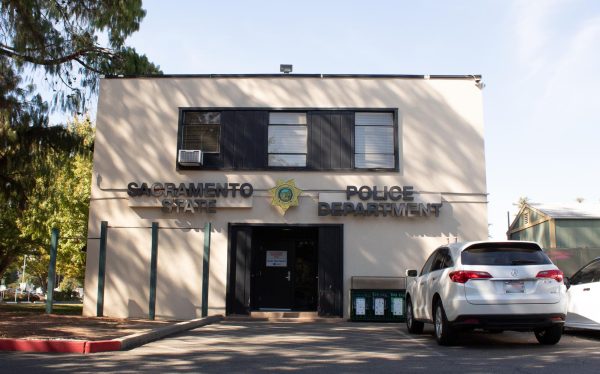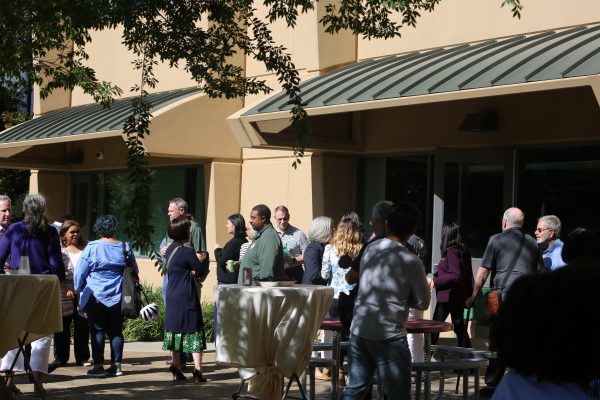Online book buying can save student’s wallets
Image: Online book buying can save student’s wallets:Sacramento State professor says professors do not force students to buy books at the Hornet Bookstore and that he’s happy if students save money on books. Photo Illustration by Jessica Donofrio/The State Hornet. :
December 6, 2006
Students who are frustrated with high textbook prices and low sellback rates in the bookstore have a new option: booksoncampus.com.
The website allows students to post books to sell and search for books to buy from fellow students on campus. By keeping the transactions local, students are able to dodge the bookstore and the hassle of packaging and shipping costs of selling and buying books online.
While students don’t have to create accounts on Books on Campus, a user name from the networking website Facebook is needed to log in.
Mark Cantor and Tim Suzeman, students from Brandeis University, were inspired to create the site when they became frustrated with the book buying and selling situation on their campus.
“At that time, I was pre-med and Tim was a bio/neuroscience major,” Cantor said, “Our textbooks were incredibly expensive and we only received a few dollars back at the end of the semester when we sold our books back.”
Cantor said that he and Suzeman realized that if they could find a way for students to buy and sell their books directly to each other then that would save a lot of money. When the site was made, it became very popular around their campus and has since taken off from there.
“We launched the site on our campus, and students loved it, and we started to get e-mails from students at other schools to bring the site to their schools also.”
Cantor also said that students at their campus have saved an average of 53 percent on their books, and this has helped word of the site spread around the country.
“This year we are working with 25 students from around the country to help spread the word and make the site great,” he said.
Kyle Cunningham, creator of the Sacramento State online forum, www.csusforum.com, said he thought the new site would be a good thing for students to have but also said he has some concerns about the site.
“One issue that they might have is the whole Facebook login, it is not used as much by students,” Cunningham said, “It will also be a seasonal website, because students only buy their books around registration time, and the rest of the time the site will not get much activity.”
Cunningham said he thought that overall the site is a good idea, and that advertising is the key to the site’s success.
Cantor said the reason that he and Suzeman decided to use Facebook as a registration to get on the website, was to make it as easy as possible for students to get onto the site, and to let their friends know about the website.
Cantor said professors who mention Books on Campus in their syllabuses has helped them get the word out about the website.
Nick Burnett, communications professor at Sac State, said professors do not make students go to buy their books at the bookstore. All the professors want is for the students to get the correct books, and if this site can get the students their books for a cheaper price than at the bookstore, then he would certainly be happy about it, he said.
“Students ought to explore any option for getting textbooks at a lower cost,” Burnett said. ” One thing that the Internet gives consumers is the ability to engage multiple vendors, so if Amazon does not have the book, then you can go and check on a site such as Books on Campus.”
Julia Milardovic, director of bookstore services for the Hornet Bookstore, said a new site such as Books on Campus ends up hurting the consumers of the books the most.
“When business is directed away from our store, it makes it harder for us to secure all the course materials adopted by our faculty,” Milardovic said. “We do not just focus on the large adoptions and ignore the more time-consuming, less lucrative titles, as online retailers do.”
Milardovic said that as Sac State’s bookstore, its job is to get all of the materials that students need and to receive them when students need them.
Burnett said the big problem that the bookstore has is that it has to convince students that going to the bookstore is the best option for buying their books.
“The campus bookstore is going to have to give students a reason to pay a higher price for their books, or they are going to have to lower their prices to compete,” Burnett said.
Burnett added that Follett’s size and accessibility for students are big advantages it has over sites such as booksoncampus.com.
Milardovic said that there are things that the bookstore does to save students money at the bookstore.
“Follett’s comprehensive used book programs last year saved students who bought and sold back used text books well over 200 million,” She said, “The savings to students on our campus was over one million dollars.”
Milardovic said that the biggest way that students can save money on the books that they need is to resell them back to the bookstore, because on average it saves students up to 63 percent over the price of new books.
Mark Cantor said the goal of this new site is very simple: “It was created to help students, so that is our mission.”
Philip Malan can be reached at [email protected]



































































































































